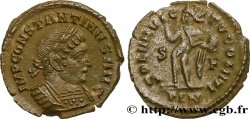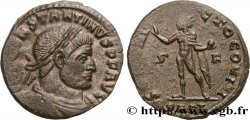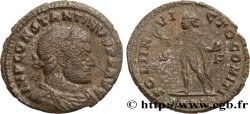E-auction 567-508449 - brm_799643 - CONSTANTINE I THE GREAT Centenionalis ou nummus
You must signin and be an approved bidder to bid, LOGIN TO BID. Accounts are subject to approval and the approval process takes place within 48 hours. Do not wait until the day a sale closes to register. Clicking on « bid » constitutes acceptance of the terms of use of cgb.fr private e-auctions.
Bids must be placed in whole Euro amounts only. The sale will start closing at the time stated on the item description; any bids received at the site after the closing time will not be executed. Transmission times may vary and bids could be rejected if you wait until the last second. For further information ckeck the E-auctions F.A.Q.
NO BUYER'S FEE.
NO BUYER'S FEE.
| Estimate : | 125 € |
| Price : | 32 € |
| Maximum bid : | 38 € |
| End of the sale : | 26 February 2024 14:31:00 |
| bidders : | 7 bidders |
Type : Centenionalis ou nummus
Date: 328
Mint name / Town : Constantinople
Metal : copper
Diameter : 18 mm
Orientation dies : 6 h.
Weight : 2,68 g.
Rarity : R2
Officine: 4e
Coments on the condition:
Exemplaire sur un petit flan centré à l’usure superficielle. Belle patine verte
Catalogue references :
Obverse
Obverse legend : CONSTANTI-NVS MAX AVG.
Obverse description : Buste diadémé, drapé et cuirassé de Constantin Ier à droite, vu de trois quarts en avant (A'b) ; diadème lauré et perlé.
Obverse translation : "Constantinus Maximus Augustus", (Constantin le grand auguste).
Reverse
Reverse legend : CONSTANTINI-ANA DAFNE/ E|-// CONS.
Reverse description : Victoria (la Victoire) assise à droite sur un cippe tournée à gauche, tournant la tête à droite, tenant une palme dans chaque main ; devant elle à gauche, un trophée et un captif agenouillé à gauche sur lequel elle pose son pied droit ; au-dessous, un bouclier.
Reverse translation : “Constantiniana Dafnæ”, (La forteresse constantinienne).
Commentary
Poids léger. Rubans de type 3 aux extrémités bouletées. Diadème composite formé de feuilles de laurier et de cabochons gemmés. Grand cabochon rond gemmé. Ptéryges invisibles sous le paludamentum.








 Report a mistake
Report a mistake Print the page
Print the page Share my selection
Share my selection Ask a question
Ask a question Consign / sell
Consign / sell
 Full data
Full data









